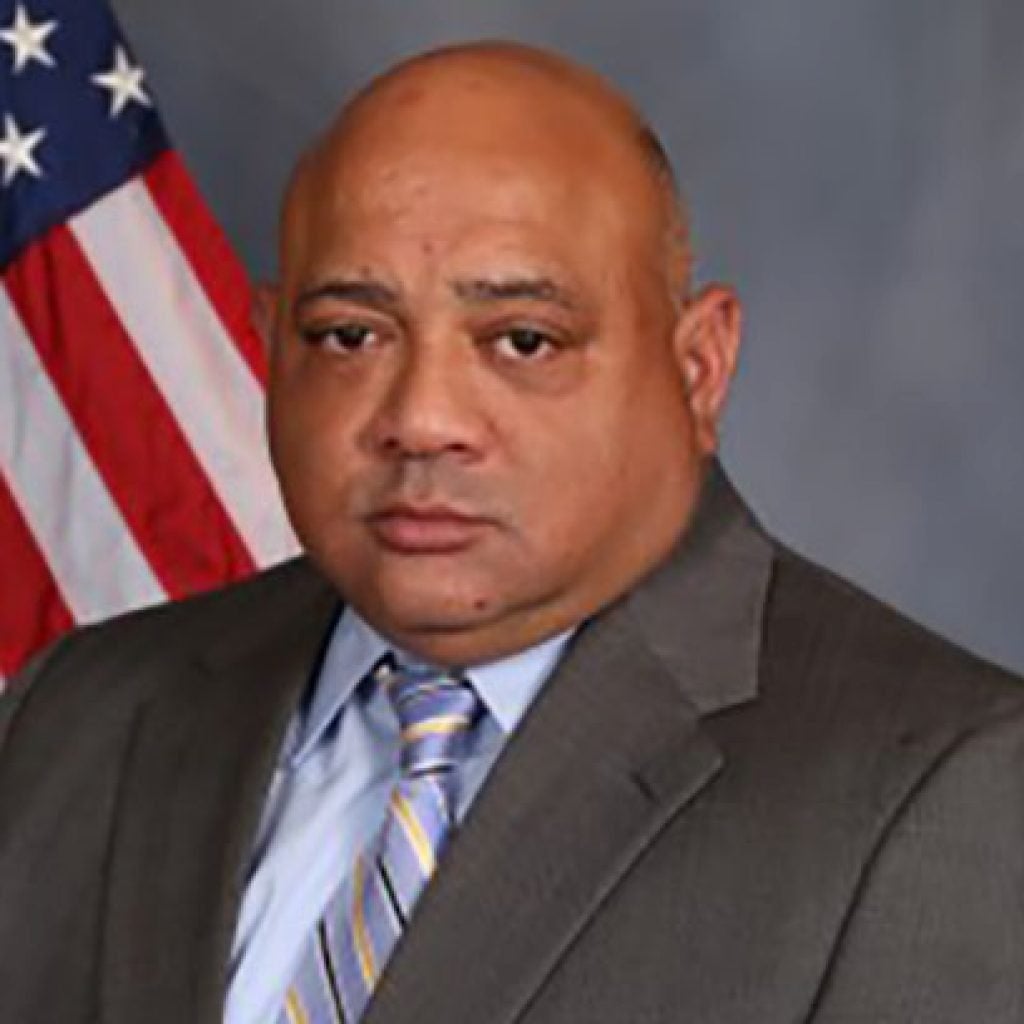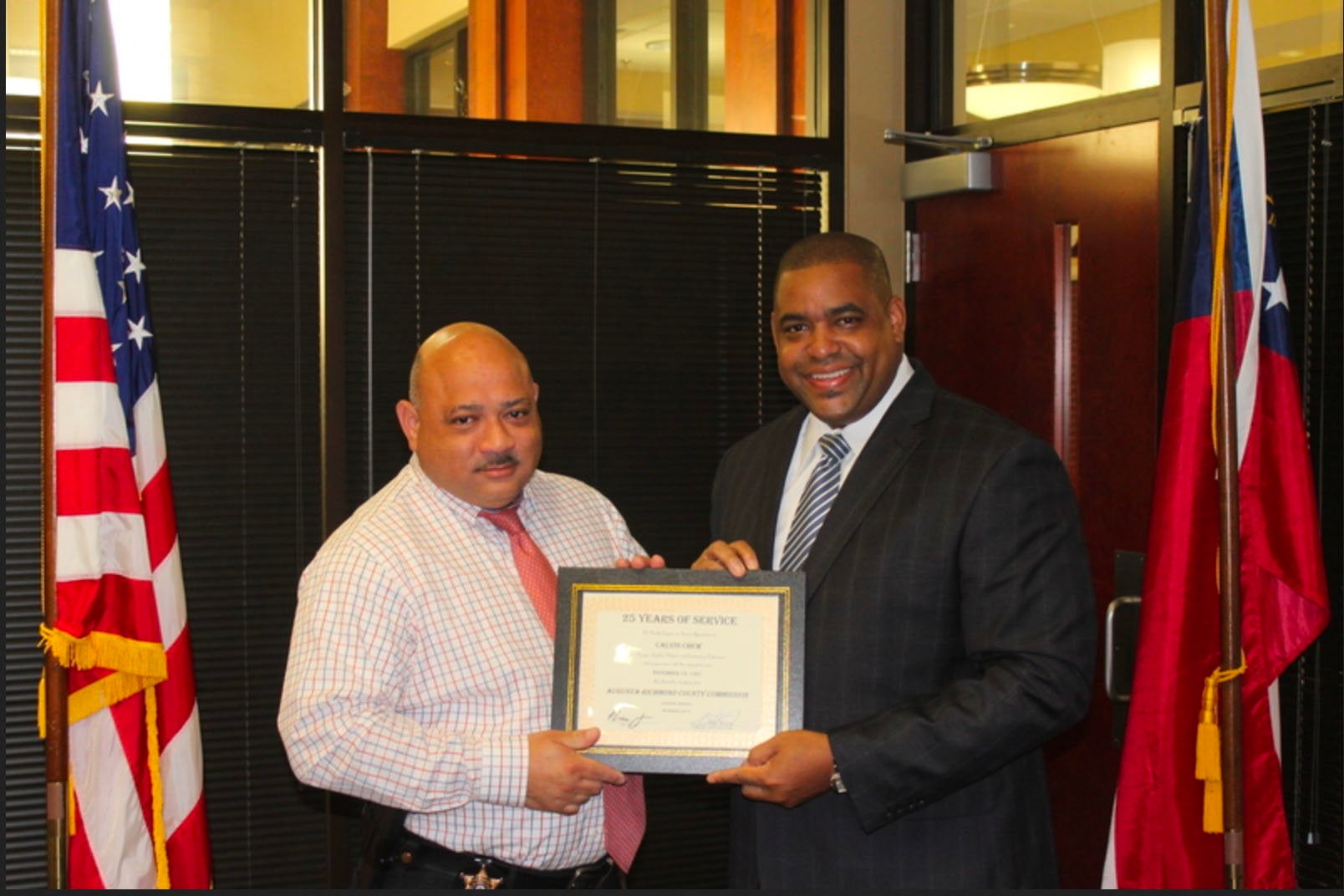Editor’s note: This is a reprint of a profile of Augusta’s new chief deputy, Calvin Chew that ran earlier in The Augusta Press. The author was an Augusta Univerity student when she wrote the story.
by Zaria Scott
An ironed, white-collared shirt and neatly placed tie complement the gun and holster hanging from the belt of the man working intently at his office desk.
The desk is covered with mounds of paperwork. In the background, a dispatch radio emits faint chatter. This man can multi-task. He listens to the chatter as he scrolls through his emails.
Opinion: Michael Meyers on Seeking Crime Reform in Augusta
Seemingly serene moments of close concentration pass. Then, concentration breaks. Richmond County Sheriff Richard Roundtree walks by, peaking into the office. The man looks up.
“Hey, Sheriff, did you need me?” he asks.
“No, I don’t,” answers Roundtree.
On the left side of the room, a golden plaque sits in a place of honor on a shelf. It reads, “Lt. Colonel Chew.”

Calvin Chew is a part of the command staff with the Richmond County Sheriff’s Office. The command staff is made up of Sheriff’s Office division heads, each of whom have unique responsibilities and deal with policy and personnel matters.
Members of the command staff “make final recommendations to the sheriff on several personnel matters. These commanders and supervisors also serve in a variety of ways to carry out the mission of the sheriff,” the Sheriff’s Office webpage explains.
Making recommendations to the sheriff is important work, but for Chew, carrying out the Sheriff’s Office mission is more than just a hard day’s work.
“To me, it’s not a job. I care. This is what I do. The responsibility is on me to ensure that the public is served. As lieutenant colonel, I focus on how I can make the agency better, and how we can make officers more aware,” Chew said.
Chew has been with the Richmond County Sheriff’s Office since 1991. He has dedicated 30-plus years of service to Richmond County law enforcement. He has carried out the mission of the Sheriff’s Office under former sheriffs Charles Webster and Ronnie Strength, but he says his journey and experience under Sheriff Roundtree has been his most impactful.
“The first two sheriffs were really good, but Roundtree is the best sheriff we’ve had. The opportunity and growth accredited to him is amazing. Roundtree gives his officers a voice,” Chew said of his former partner.
Chew speaks from his own experience with Roundtree’s administration. In 2012, when Roundtree was elected sheriff of Richmond County, he immediately instituted some new initiatives that changed the way the Sheriff’s Office was structured. Those initiatives became the catalyst for Chew’s own career growth.
“When Roundtree became sheriff, I explained to him that I would do whatever it takes to bring about the mission of the Sheriff’s Office. He took me seriously,” Chew said. “I loved to work investigations. That was my comfort zone. Roundtree took me out of investigations and challenged me to help develop and revamp the Internal Affairs Department. He was concerned about the department’s amount of public interest. I was the man given the job. I investigated officers and helped create a process for the way officers were reprimanded when they did wrong. Several changes in that department were made during my time in Internal Affairs.”
Chew’s investigative abilities first appeared when he was a college student. He attended the University of Maryland on an athletic scholarship. He admits to being unfocused as a student. Originally from Jamacia, Chew was new to the United States when he arrived at the College Park campus, which is just outside of Washington, D.C. He spent his student days playing soccer, majoring in business and partying. He wasn’t interested in his business classes, he said, but his true passion would find him when he least expected it.
“All-American basketball player Len Bias died in his dormitory room on the University of Maryland campus. He was pronounced deceased from cardiac arrest,” Chew said.
Bias died when an unusually pure dose of cocaine stopped his heart, according to news reports at the time of his death. He was a college senior and the Boston Celtic’s second-round draft pick in the 186 NBA draft. Bias’s body showed no evidence of long-term drug use, Maryland’s Chief Medical Examiner John E. Smialek told the Los Angeles Times in June 1986. The dose that killed him could have been his first ever, Smialek added.
“Medical examiners said he used drugs that may have killed him. Investigators were sent to campus to find out what happened. Going into my junior year of college, I became intrigued with the investigative process. It inspired me to want to become a part of law enforcement. I knew I wanted to be an investigator.”
That inspiration caused Chew to think more about the direction of his life. He started to take college seriously. He stopped partying and focused on studying. He was determined to fulfill his new-found passion for investigation.
“After that summer, when I came back to college, I changed my major to criminal justice. I started paying attention in class. It just clicked for me. I really started to think about what I wanted to do after school, and I knew I wanted to serve. I thought about how I could show this country that I was fit to serve. I couldn’t get a law enforcement job because I was not yet a citizen. I tried to become a military police. Instead, I ended up joining the army as a combat medic. I was sent to Korea. During my time in that program, I received amazing training and experience. While there, I received call that my citizenship was to be approved, but I had to wait until the program was over to come back into the country,” Chew said.
When he finally received citizenship and returned to the country, the CIA began recruiting him, Chew said. That job opportunity fell through due to the First Gulf War, though. The military involuntarily extended his time because of the conflict, he said. When he did get to come home, Chew said he was more determined than ever to work in law enforcement. He began applying for jobs right away, and the Richmond County Sheriff’s Office was the first to respond.
“I remember them saying, ‘We will hire you,’” Chew said. “This would be the start to the career I promised myself back in college.”

Chew worked in a number of Sheriff’s Office departments. He says he “volunteered for everything. I worked hard. I became well known around the department for my skill and determination. To me, I was doing what I loved. I wasn’t married then, so I dedicated myself to the long hours.”
Capt. Patrick Young, commander of the Criminal Investigation Division, vouched for Chew’s abilities.
“I noticed from the beginning that he carried himself well and was a very intelligent man. I watched him grow as a law enforcement officer as he transferred from road patrol to violent crimes. His ability to see things differently, from another viewpoint than others, served him well in investigations.”
One of those viewpoints concerns shortcuts. Chew is adamant that shortcuts cause trouble.
“You have to do the right thing. There are absolutely no shortcuts,” he said.
Chew shared a memory of a time the fellow officers thought he would receive a shortcut.
“Back before Roundtree was sheriff, we were partners,” he said. “We would joke that one day he would become sheriff. I used to jokingly say, ‘No, you won’t be sheriff,’ but I could tell he was serious and see his determination. When Roundtree was elected sheriff, officers lined up at my door. They all thought I would become second in command. I laughed but knew this was not the case. I knew he shared my no shortcuts sentiment.”
Chew was proud that his former partner achieved his goals. Roundtree’s win inspired him to pursue his own goals heavily.
[adrotate banner=”23″]
“I was still working in the Internal Affairs Department. I started to apply for other positions in the department in hopes of getting back to investigating,” Chew said. “The Major of Field Operations position came up. I applied, but I didn’t know at the time that the investigator for the Violent Crimes Division was retiring. I was being considered for that job.”
Chew explained that the Violent Crimes Division was his most difficult yet most rewarding experience at the Sheriff’s Department. He partnered with Roundtree to solve crimes.
“When Lt. Colonel Chew and I were partners in the Violent Crimes Division, he had the ability to utilize his investigative strengths to maximize mine,” Roundtree said.
Chew remembers that the Violent Crimes Division gave him some of his most t”eachable moments.” What stood out to him most was the lessons he learned about people and community policing.
“I learned so much while working in that division,” Chew said. “The Violent Crimes Division is the most elite division of the whole department. We handled all nighttime investigations. No matter the crime; it could be murder, theft, or anything. It didn’t matter. I was there. When you’re out on crime scenes or dealing with people, all crimes are equal. You just had to understand that people’s feelings matter. The people want to know that you can and will help them. Each scene needed to be handled correctly and taken seriously. It’s important to get out in the public and show them you care.”
Because working violent crimes is a demanding job, Chew always remained prepared. He had a routine of ironing all his shirts for the coming week. He knew that his phone could ring at any hour, and he would have to go to a crime scene. He was determined to be ready to respond.
“Having a plan as a law enforcement officer for how your workday will go is wasted time. Changes are constant. You should always be prepared. I ironed my clothes for the whole week. Even on Sundays, early morning or late at night, you never knew if you would get a call to go out to a crime scene. It was my responsibility to make sure that scene was handled properly. It was on me. I was out on every call. I knew that I had officers below me who could possibly see me there. I wanted to be there for the people. Being present out in the public helps boost morale, but mostly it makes people feel comfortable,” Chew said.
[adrotate banner=”19″]
Chew remembers going into a uniform shop called Sidney’s, located on Broad Street in downtown Augusta. He said it is rewarding to be greeted by a worker. He said the worker told him something that he would never forget.
“I walked into Sidney’s to get my uniform. The man at the counter said ‘Chew, you are the epitome of what law enforcement is to be. You are the one constant at the Sheriff’s Department,’” Chew said.
Chew carries that memory with him on his harder days. He said he always tried to live up to what that man at Sidney’s thought of him.
To continue his growth as a lawman, Chew left investigations and went to the FBI Academy in 2016. He said he had been putting the training off for a while but decided it was time to prepare himself to move up in the department.
“The FBI Academy was the most rewarding experience I ever had in a class setting. I got to meet people from all over the world, and I learned new tactics that support my career,” he said.
News Analysis: Unsolved Murders Soar in Augusta-Richmond County
Now as a lieutenant colonel, he has the title that emphasizes his hard work.
“I am honored to be promoted to lieutenant colonel. The way the ranks go is that the lieutenant colonel is a position they made for me to be able to shadow the colonel. The old colonel is retiring. I will take over as colonel when that happens. I am currently learning skills to pair with my previous experience. I value being part of the executive leadership team,” said Chew.
Zaria Scott is a guest correspondent for The Augusta Press. Reach her at producers@theaugustapress.com.
[adrotate banner=”38″]








